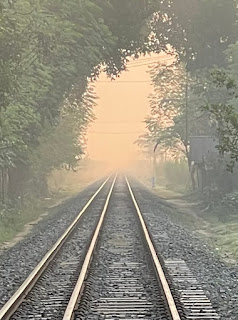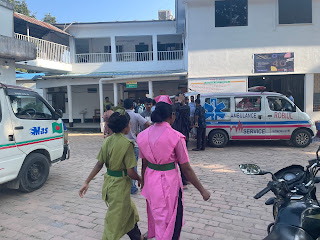But when you give to the needy, do not let your left hand know what your right hand is doing, so that your giving may be in secret. Then your Father who sees what is done in secret, will reward you.
Matthew 6: 3-4
The Pharisees preferred human praise to the glory of God.
John 12: 43
Lamb’s interesting location
Lamb Hospital is located in the most northern region of Bangladesh, not far from many international borders: India, Nepal, Bhutan, Myanmar, and Tibet. Amazingly, Mount Everest is closer to the hospital than is Bangladesh’s capital city, Dhaka. But you wouldn’t know it, because the area around the hospital is flat without a hill or mountain to be seen. It’s about 2km to the nearest town, Parbatipur.
Rice is nice
The hospital is surrounded by vast rice fields. Small farming villages are tucked away in between the fields. Towns are not that far from each other. Travel to Paratipur and other small towns is cheap by bicycle rickshaws, motorcycle taxis, small buses, or by train. It’s like small town rural USA in that way, but without cars. Private automobiles are scarce.
A different feel. A different look.
This Asian hospital is a mixture of Muslims, Hindus, and Christians. The Lamb is a very friendly place. I made friends with just about everyone. I made fast friends with the men at the fruit stands in front of the hospital and with the guards in their smart blue uniforms. Women always look very nice wearing their brightly colored saris. And though I am not a Muslim, it is hard not to admire the devotion of Muslim women who cover themselves and adhere to their very strict dress codes, working hard to stay consistent with their beliefs.
Red hair dye
Many of the older men dye the hair of their heads and beards with an off-color red hair dye.
I was struck by this at first. Why do they do it? For some, it is to indicate that have completed a pilgrimage to Mecca (the hajj). For others, it is to follow the ways of the Prophet Muhammad, and to differentiate themselves from Christians and Jews.
And others try to hide their grey hair (It doesn’t work!).
Baby Hindu Forehead Spots
Almost all the babies I saw had small black spots placed off to one side over their foreheads by their mothers. Why? It’s because of the “evil eye”. The “evil eye” is an ancient superstition in Eastern cultures. It is a supernatural belief that a curse can be brought against their child by a simple malevolent glare, usually by an envious person. To protect their children, mothers place a black spot (or bindi) on their babies’ foreheads. This is meant to diminish the beauty of their child and keep the evil eye away.
LAMB Hospital’s 40th Anniversary Celebration
I was lucky enough to be there during the birthday celebration of the hospital.
The front lobby waiting area was decorated with festive balloons plus a big TV screen. The celebration was complete with speeches, projected recordings of congratulations, and musical performances with classical Asian dancing. Members of our small team came together on stage to sing: “He’s Got the Whole World in His Hands” while I sat in the back, taking pictures.
Sounds from the rice fields
Trains. There’s a train track that hugs the back boundary fence of the hospital property. Small passenger trains roar through several times a day. It’s an urban feel in a very rural area!
The Muslim call to prayer. The Muslim call to prayer several times a day, often before dawn, trumpeted from the load speakers perched on the small towers of the mosque down the main road in front of the hospital. This is standard in all Muslim countries.
A fantastic community
Community means everything, especially when you are far from home and far from what is familiar.
And the Lamb community was among the warmest, nicest, and most powerful that I have ever experienced. This place has a heart. Every member of the ‘team’ is a devout individual, trying their best to be of service to those around them. They come from the United Kingdom, the Netherlands, Canada, India, Brazil, New Zealand, and the USA. The missionaries are physicians, nurses, schoolteachers, and administrators. There were ‘first-timers’ who were trying to find their way, mixed with veterans of all ages who had served 10 and 20 years and even longer. Living in the guest house, I saw a steady stream of members of various aid organizations coming and going. It takes a lot of people with many different skills and backgrounds to keep a mission running. Each member of the community touched me personally in some way and made me better. I made several deep friendships that will affect me for years to come. We had wonderful meetings on Tuesday and Friday evenings. Tuesdays were special because each of us would tell each other what we were thankful for during the previous week. We learned of each other’s struggles and worries. This brought us together. Prayer requests often ranged from patients who needed special help in the hospital to people back home with cancer or elderly grandparents who needed extra help. And on Saturdays, I learned about a board game called: “Ticket to Ride”. A group of us would get together and playfully compete. I just liked being with everyone and I always did my best to lose. And I always did.
Lamb was a fortunate discovery.
Through them, I was introduced to Lamb’s only surgeon, Dr. Antje O. I asked her when she needed some time off. With her Dutch precision, she told me exactly when to come. And I am glad I did.
Lamb’s origins
The vision for LAMB began in the early 1950s. Mr. John Otteson saw the need for medical care where there was none. He decided to do something about it. W All of us have good ideas, but very few of us actually carry them through and make those ideas real.
Lamb today
Lamb Hospital today has 150 beds and has been in business for 40 years. Its clinics see nearly 200 patients a day, or more than 60,000 per year. In addition, per year, Lamb treats nearly 10,000 in-patients and delivers 3,000 babies. There is a rehabilitation center, a primary school for children, a nursing school, and a training program for young doctors. Quite a place!
 |
| 1 |
What’s in a name? LAMB does not mean “Lambs”.
I was fooled. Lamb’s name has nothing to do with “Lambs”.
The hospital’s name comes from an abbreviation:
“LAMB” = Lutheran Aid Medical Bangladesh.
And before Bangladesh independence, the name was
“LAMP”: Lutheran Aid Medical Pakistan.
Surgery Clinic
Armed with a translator, I met with people in surgery clinic 2-3 times per week. In clinic, we try to help people solve their problems, and schedule them for surgical procedures when needed. At first, I didn’t like it that people had to pay for their operations in advance. But Dr. Antje O. told me that if they didn’t, many wouldn’t show up for their operations!
Glove re-cycling
Used gloves drying in the sun after their being cleaned create an interesting sight. We never see this back in the USA. Just about everything that can be sterilized either in an autoclave or with antiseptic fluid is reused.
Making the Attempt to Learn the local language
It’s so very confusing. I’ve been traveling to so many different countries that I gave up trying.
Kenya speaks Swahili. Malawi speaks Chichewa. Chad speaks French. Egypt speaks Arabic.
It’s too much. But even so, I’ve concluded that it’s important to try anyway.
It matters. Local people are so delighted when we try, even if we’re not successful.
And the effort and desire to learn brings us together.
So, on this visit, with the help of a veteran missionary nurse, Sarah, I hired a local person to help me to learn some “Bangla”, the local language. It was my teacher’s first attempt at being a language teacher and my first attempt to learn Bangla. We stumbled along. In the end, I am glad that I tried.
The world is not what I thought it was.
My European friends taught me some things.
I was taught by a Dutch volunteer that the proper word for his country was not Holland, but the Netherlands. Noted!
And then I hit a nerve of our Welsh anesthesiologist when I asked what part of “England” she was from. She gave me a curt history lesson about how Wales was originally independent and not a part of “England” at all. It was only later that they were unwillingly connected with England they later became part of the “United Kingdom”. Noted! Whew! I won’t make that mistake again! Obviously, I need to study more about British history.
One meets incredible people in the missions. One of the missionaries was a female surgeon who was sharpening her surgical skills to prepare herself to work in Afghanistan next year. She’d been there before and knew the needs there. Women physicians are very needed in Muslim countries, because women insist on being treated by women physicians. I helped her as much as I could. I hope I did.
Toothache: Another lesson learned
Before I left, I dutifully went to my doctor, and I was cleared to go. I skipped the dentist. Time was getting short, and I thought that it was just “too much trouble” to see my dentist before I left. So, I didn’t. Bad decision. Just 3 weeks into my mission, I had a terrible toothache!
I emptied my emergency bottle of antibiotics and took a lot of Tylenol. Let me say that it was a lot more trouble finding a dentist overseas than it was back home! Finally, with the wonderful help of the home organization, I found a dentist in Dhaka on my arrival. Problem solved. And a lesson learned.
God works best in our weakness.
I’m always trying to do my best.
And when I fail, I feel remorseful and weak.
God knows I’m not the sharpest tool his toolbox.
God tells us: “My grace is all you need. My power works best in weakness.”2
In tough times, we all need to step back, let go and trust God to run things.
So, I trust and always pray for another chance. I don’t know when my last one will be.
And when He gives me that chance, I’m ready and I act with all I’ve got.
Later, after good things have happened, I don’t look for applause.
I just look up, smile, and give God a grateful head-nod.
He knows. That’s all I need.
1. Photo by Sarah Fischer RN
2. 2 Corinthians 12:9














